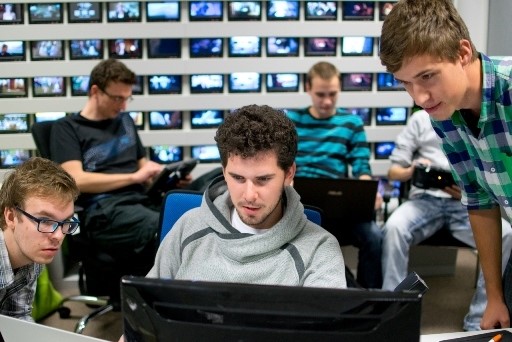DA-SPACE - Young STU students of informatics fight corruption, “train” artificial intelligence or develop system for intelligent parking
19-03-2018
Students innovate according to the requirements of industrial practice and gain entrepreneurial skills. This project of Open Innovation Lab started by the STU Institute of Management together with the STU Faculty of Informatics and IT. Students get lectures on entrepreneurship skills and solve project challenges agreed directly with companies. The Slovak University of Technology (STU) conducts the DA-SPACE project within the Interreg Danube Transnational Programme.
Via the challenges the young students of informatics fight corruption and improve searching in databases of contracts of public institutions. They try to make education more attractive through virtual reality apps. They develop recommendation algorithms for e-shops. They design systems for intelligent parking or “train” artificial intelligence software to be able to provide better answers to client questions.
These challenges – projects students solve based on the requirements from specific companies, NGOs and public institutions. The purpose of the DA-SPACE project (Open Innovation to Raise Entrepreneurship Skills and Public Private Partnership in Danube Region) is that the innovative ideas of students do not end up „in a drawer“. STU works in the project using the EU funds within the Interreg Danube Transnational Programme aiming at the creation of open innovation labs supporting collaboration of young innovators with practice in seven Danube countries.
„Traditional manner of corporate innovating uses the results of own research and development of products, services or processes, that are further developed to the shape suitable for the market. These innovations are protected from the competitors and are known as closed innovations. Current requirements of higher pace and efficiency of innovation processes led to the origin of a different pattern of corporate behavior – open innovations. In the innovation processes companies collaborate with their customers, external environment (universities research institutes and even with competitors) in order to be able to use the innovation potential for mutual benefit. They shoot up interest-based innovation platforms there which successfully intermediate such forms of collaboration and co-creation on commercial basis, explains Marian Zajko, Director of the STU Institute of Management in Bratislava.
The STU Institute of Management participates in the project DA-SPACE in collaboration with the STU Faculty of Informatics and IT using the experience of this faculty with innovative IT projects. Each year students of STU FIIT simulate within the course Team project work the work in IT development teams solving current issues faced by IT companies. Eight of these teams solve challenges within the DA-SPACE projects where they can also use additional entrepreneurship training for development of business plans. This training is considered of considerable benefit for the students since high innovation intensity in the IT sector is a source of numerous start-ups there.
“These projects are among the most popular ones with students. The reason is the topics to be solved there. Engagement of external entities and mentors in projects brings even more appealing topics and new experience both for the students and their teachers coaching the teams. At the same time it is a platform for new collaboration with companies NGOs and public institutions strengthening the university – industry collaboration,” said Professor Mária Bieliková, guarantor of the Team project course at FIIT.
The DA-SPACE project takes two years. It will continue in the next academic year as well when further student teams join in the co-creation process with companies and other institutions.
Innovative challenges tackled by the student solver teams within the STU Open Innovation Lab:
- Struggle with “info jungle” – development of importer of public datasets (Project where students collaborate with the Dept. of Investments and Informatization of the Office of Vice chairman of Slovak Government. The goal is to develop a web tool that enables also the non-technical users in the offices simple import of datasets to be used in the web site data.gov.sk.
- More transparency and less corruption – open contracts (Collaboration with the Fair Play Alliance is a continuation and enhancement of the successful project Opencontracts.sk with the goal to support search for links in public data registers, and search and analysis of suspicious contract data).
- Virtual reality for attractive education (Collaboration with the STU Faculty of Electrical Engineering and IT on the project Newton within the Horizont 2020).
- Smart e-shop – better recommendations for e-shops (Development of web app for easier selection and recommendations in an e-shop with a fast response, co-created with the company Discount of the Day (Zľava Dňa).
- System for collection of travelers’ feedback (Development in collaboration with company Molpir to foster further improvement of travelling, solvers try to develop a Musical Operating Device for collection of this feedback.)
- Portal for improvement of investment skills (Collaboration with company Mentor Partners – development of a portal fostering investment decision making in various financial products).
- Artificial intelligence as virtual voice assistant (Collaboration with company Accenture, virtual assistant in Slovak is capable of recognition of meaning of questions from a specific knowledge area and formulate adequate answers to them).
- Smart parking (Collaboration with company Unicorn, development of system for fast and efficient search of parking slots in a city using the LoRa network of company Orange).
Marian Zajko, Andrea Settey – Hajduchova

